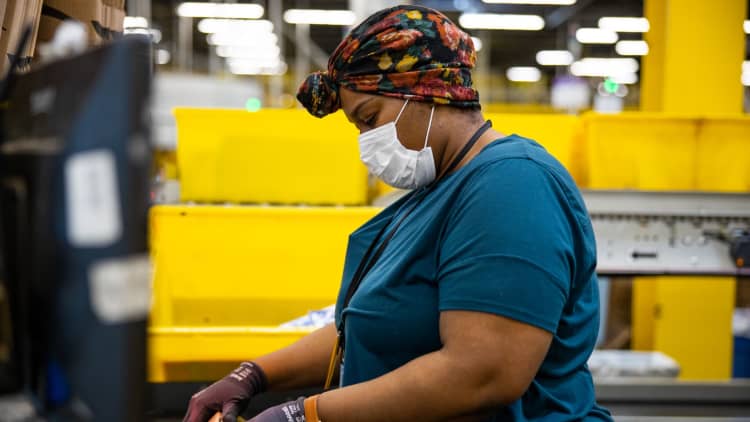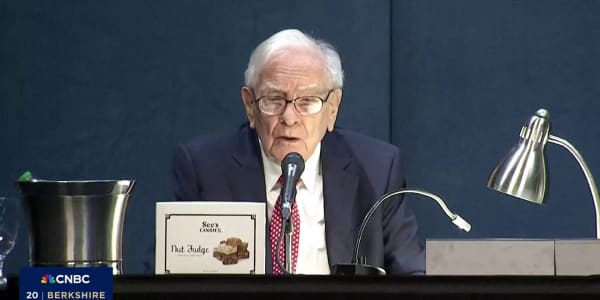Temperature checks at entrances, questionnaires about Covid-19 symptoms and required coronavirus tests for employees returning to work — it's all part of the increasingly common measures employers are now putting in place to guard against a second wave of the pandemic.
The measures are meant to protect workers from becoming infected, and assure jittery employees that it's safe to return to work. But the laws allowing such measures are also brand new and could plunge employers into a legal gray area between maintaining the health privacy and confidentiality of workers and ensuring workplace safety.
For Cushman & Wakefield, one of the largest commercial property landlords in New York City, the problems can start right at the entrance. "If I come in and I have a temperature, I have to get a second check. Who tells me I can't go up," says John Santora, New York Tri-State Chairman at Cushman & Wakefield. Santora says that while the landlord will notify the tenant in charge of the employee, they would defer to that tenant's final decision — even if that decision is to allow the employee to enter the building. "Temperature screening brings in significant liability issues for us as a landlord," Santora said.
If it feels a bit strange to have your temperature taken every time you enter your workplace, that's because health has long been a taboo subject in most workplaces. Part of this is by law. The Americans With Disabilities Act prohibits employers from asking about employee health or undergoing a medical test unless it's related to the job and consistent with business necessity. Health is treated as a matter of personal privacy.
All this changed with the coronavirus. After the disease was declared a pandemic by the World Health Organization in March, the U.S. Equal Employment Opportunity Commission revised its guidance on what is permissible under the Americans with Disabilities Act. The guidance allowed employers to screen for the infection to help protect their workers, including using temperature screens and tests.
Health actions that employers can take
Under the new guidelines, legal experts say employers are now allowed to take two actions to protect their workforces: temperature screening and checking for symptoms of the coronavirus. Employers can also exclude workers they suspect have symptoms from the workplace. "The EEOC wants employers to have the ability to exclude people who have the symptoms and frankly not worry about being sued," says Barbara Hoey, partner and co-chair of the labor employment group at Kelley Drye & Warren.
For businesses not comfortable with the idea of testing all employees, legal experts suggest transparency. Communicate what the thresholds are on temperature and on symptoms, and lay out for employees when they might be sent home. "The best idea is to have a consistent process that applies to everyone," says John Merrell, a partner with the law firm Ogletree Deakins.
Some employers are embracing this new paradigm of testing workforces for coronavirus. Stanford Health Care, a major San Francisco Bay Area hospital, re-opened for almost all procedures — but as part of that re-opening, is testing all of its 14,000 patient-facing employees for the coronavirus using a test the hospital developed in-house. David Entwistle, President and CEO of Stanford Health Care, said the testing was necessary to reassure patients the hospital was safe to visit. "For our patients to trust the clinical procedures and trials, it was important for them to know that we were safe," said Entwistle.
The hospital says it's also taking other precautions: nurses and clinicians are stationed at each entrance to scan for temperatures. Scannable QR codes lead to a web app that collects and reports on symptoms through a questionnaire.
New coronavirus health technology emerges
Stanford Health Care is not alone. Businesses and organizations are widely predicted to use technology to help fight the spread of coronavirus. Contactless thermometers are increasingly common, from handheld units to standalone kiosks designed to measure temperatures along with answering a health questionnaire. They're even being integrated into the time clocks employees use to punch in — timeclock maker Ascentis announced an add-on designed to check employees in and record their temperatures at the same time. And companies are rushing to develop contact tracing technology that helps track employee interactions to identify and contain potential outbreaks.
The urgent need for such technology caused longtime tech rivals Apple and Google came together to develop a cross-platform version designed for widespread use.
The technology is expected to be so popular the CDC even provided extensive guidance on its use. It came as part of a 60-page document released by the CDC last week and outlining how the United States could reopen despite the continued threat from coronavirus. This week, the CDC released specific guidelines for what a return to office buildings should look like. Among the suggestions: temperature checks, mandatory masks, and distant desks, closing common areas.
Demand for such widespread testing is high. "I would love to have everybody in the company get a test to see whether they're free of the virus," said Stew Leonard Jr., President and CEO of U.S. grocery chain Stew Leonard's. "It would be really good if we could test everybody in the company, and then have some type of temperature check when they came into work."
He says the lack of available testing remains the main impediment. In the meantime, Leonard Jr. says his company has put up barriers that encourage social distancing, and asked employees not to come in if they don't feel well.
Entwistle says he's fielded the same questions and concerns from leaders around Silicon Valley, including from VMWare CEO Pat Gelsinger. "They've asked the same questions," said Entwistle. "Should we be doing serology testing. Should we be doing testing? What protocols should we be putting into place?"

Hoey says she fully expects the guidance will revert to classifying temperature checks and questionnaires as unlawful when the coronavirus crisis ends. In the meantime, she warns that screenings and testing are set to become a part of everyday life the way metal detectors became commonplace after September 11. "It's an inconvenience, yes, but for the greater good of everyone, you submit to the screening," says Hoey. "I think everyone is going to have to accept a loss of privacy and loss of convenience."
Merrell says open-ended questions and ambiguities are likely to remain because the guidance issued by the EEOC is new and will change along with the threat from coronavirus. "The heightened threat to people and safety in the workplace have provided [the Equal Employment Opportunity Commission] to provide screening which wouldn't be provided in normal times," Merrell said. In fact, he says government restrictions will continue to evolve along with the virus's spread, and that the guidance could shift over time. "I think they're doing the best they can," he said, adding, "We're in extraordinary times."
For more on the convergence of new technology and the future of work, request a ticket to join the CNBC @ Work Spotlight virtual event on June 18, featuring VMware's Pat Gelsinger, Honeywell Connected Enterprise's Que Dallara and Genpact's "Tiger" Tyagarajan.






